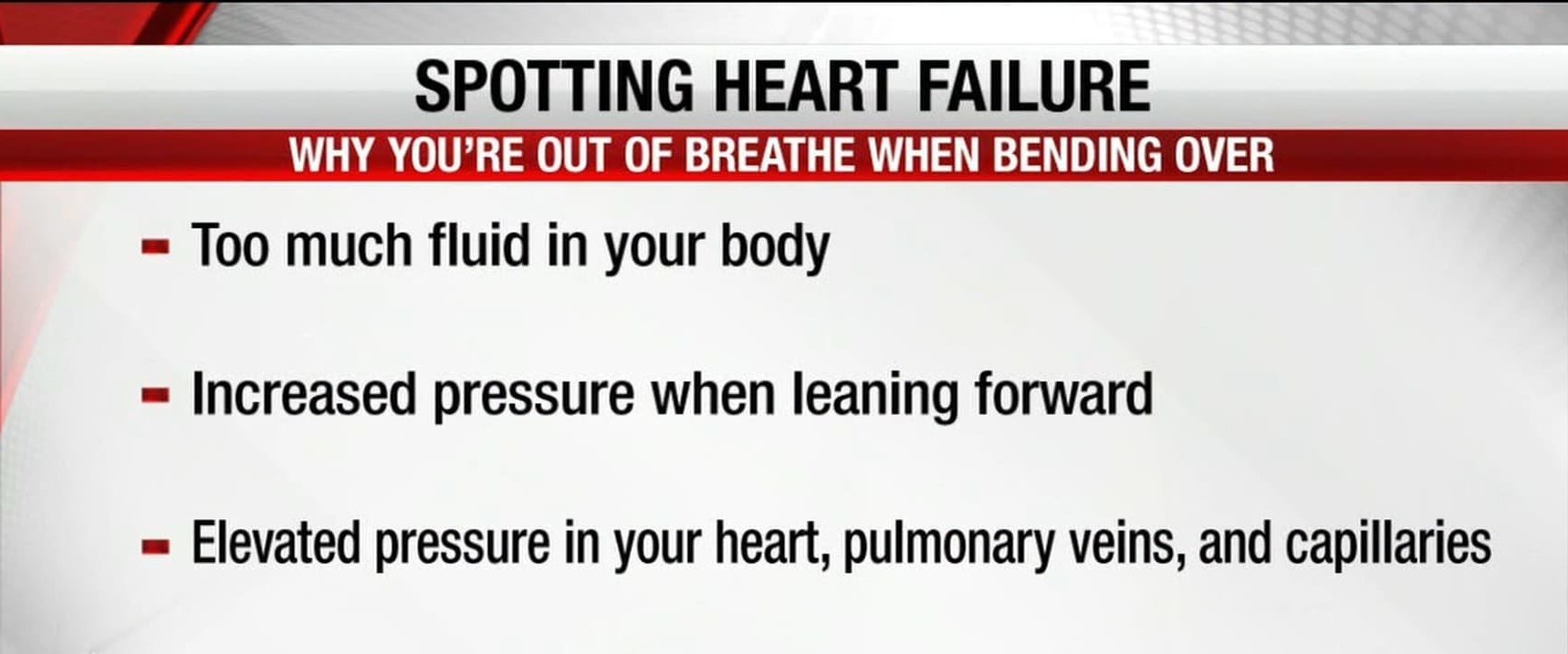A Simple Way to Suspect Heart Failure
Do you get short of breath when you bend forward, such as to tie your shoelaces or put on a sock? If so, here’s what this symptom could mean and why you shouldn’t ignore it.
What this Symptom Could Mean
If you bend forward and get short of breath, do NOT ignore this symptom! This symptom was recently coined as “bendopnea” (pronounced bend-OP-nee-ah). This symptom could be a sign of heart failure.
A study of 102 heart failure patients showed bendopnea was present in 28% of their subjects (29 out of 102 subjects).
When bending over, the average time it took for these symptoms to appear was eight seconds.
Some patients thought their bendopnea was due to being out of shape or overweight, but were more likely to have other symptoms of advanced disease.
Try this test: Sit down and bend forward at the waist. Are you short of breath within 30 seconds? If you have “bendopnea”, you have:

What is Heart Failure?
Heart failure, often referred to as congestive heart failure or (CHF), is a serious condition, but people often mistakenly think that it means that the heart has stopped beating.
Heart failure occurs when one or more chambers of the heart “fail” to keep up with the volume of blood flowing through them. The heart cannot pump enough blood and oxygen to maintain blood flow to other organs in your body.
The reoxygenated blood from your lungs starts building up inside your lungs when your heart can’t keep up with ejecting it to other organs in need.
The buildup of blood causes fluid (mainly water) to leak from the small blood vessels (capillaries). That is, the arms, lungs, legs, feet, ankles, and other organs become “congested” with blood and fluid which explains how “congestive heart failure” got its name.
First Signs and Symptoms of Heart Failure
- Shortness of breath (worse with exertion and/or while lying down)
- Excessive fatigue
- Fluid buildup and swelling in the legs, ankles, and feet
Are you a one-pillow, two-pillow, or three-pillow sleeper? The number of pillows you need to prop yourself up in order to relieve the shortness of breath is an indicator of more fluid accumulating in your lungs.
If you need more pillows to lay down, your heart failure is getting worse and becoming more severe.


Chest pain, including angina, is not typically a complaint with CHF. According to the Centers for Disease Control and Prevention, about 5.7 million adults in the United States have heart failure.
About 35% of patients with Class I heart failure feel no symptoms and can perform ordinary physical activities without any limitations.
Lifestyle Diseases that Damage the Heart (Increase Risk for Heart Failure)
- Coronary artery disease (clogged arteries)
- High blood pressure
- Diabetes
Unhealthy Behaviors that Lead to Disease (Increase Risk for Heart Failure)
- Smoking
- Being overweight or obese
- Not being physically active
- Consuming too much fat, cholesterol, alcohol, sodium
Treating Heart Failure
Although heart failure is a serious condition that progressively gets worse over time, there are a number of treatments that can relieve symptoms or even reverse heart failure or at least stop or slow the gradual worsening of the condition:
- Taking medications
- Reducing sodium in the diet
- Getting daily physical exercise
Deaths from Heart Failure Vary by Geography
Heart failure is more common in some areas of the United States than in others. States with the highest concentration of heart failure deaths:
- Texas
- Oklahoma
- Mississippi
![]() Karen’s Fit Tip: If you have bendopnea, be sure to tell your physician! It can be difficult to assess when you are retaining fluid.
Karen’s Fit Tip: If you have bendopnea, be sure to tell your physician! It can be difficult to assess when you are retaining fluid.
This bendopnea assessment is a simple and noninvasive tool to diagnose excessive fluid retention and compromised blood flow. Also, weigh yourself daily as a sudden increase in weight may signal fluid build-up.






